Share this post
As we approach the end of the year, now is a good time to ponder English language teaching (ELT) trends for 2023.
When Ellii asked me to write this post, I started noting some of my own ideas. However, ELT is a huge industry. I wanted to make sure that my post truly reflected trends across the industry.
It would be all too easy to be blinkered by my own echo chamber, so I posted my question on social media.
The responses were both reassuringly similar to my own, but also rich in diverse and innovative teaching and learning methodologies.
Here are six English language teaching trends you can expect to see more of in 2023.
1. Green ELT
As the climate crisis accelerates, so does the interest in environmental topics in the ELT classroom.
In 2019, Dan Barber declared a climate emergency at the closing plenary of the Innovate ELT conference. Following that, Barber, Ceri Jones, Katherine Bilsborough, and Christopher Graham founded ELT Footprint, an ELTon-winning collaboration focused on making ELT more sustainable.
Since then, there’s been a growing number of green ELT organizations and industry leaders getting involved: Renewable English, Green Action ELT, and Colm Downes who published this informative Twitter thread.
The appetite for green discussions, carbon-neutral conferences, and more environmentally focused resources in ELT is growing. I’m also noticing more integration and reference to the UN’s Sustainable Development Goals.
Harry Waters, founder of Renewable English, had this to say:
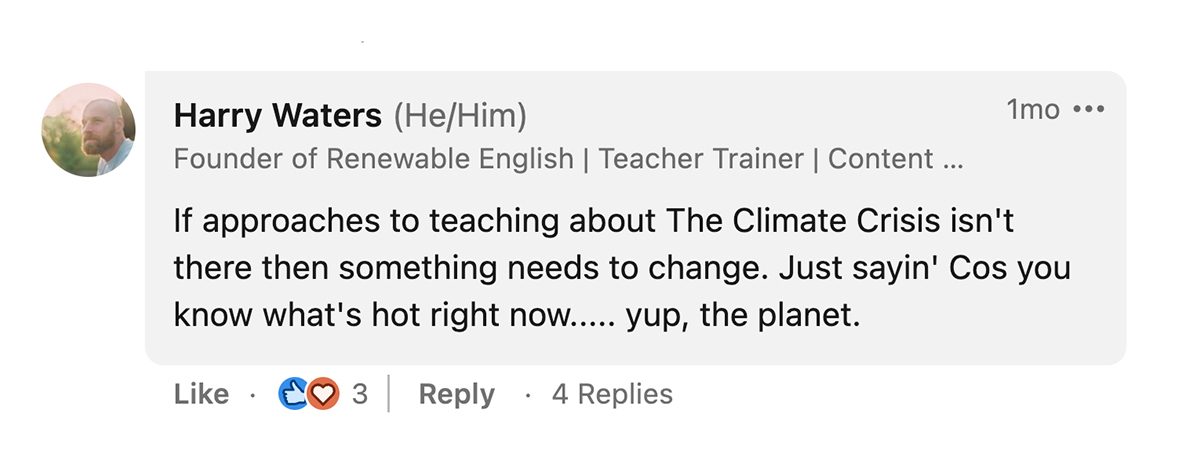
The Environment
From heat waves to ecotherapy, Ellii's Environment collection is an excellent way to teach green in 2023.
2. DEIB: Diversity, equity, inclusion & belonging
Diversity, equity, inclusion, and belonging (DEIB) will continue to play an important part in the ELT industry in 2023. English language teaching, by its very nature, is beautifully multicultural and diverse. Our learners represent all ages, races, genders, (dis)abilities, religions, sexual orientations, marital statuses, family backgrounds, etc.
The pursuit of equity for all is not new, but it will continue into 2023 and beyond. There are ever-growing discussions, webinars, and resources on making the world a fairer place.
This includes topics like:
- creating accessible learning materials
- supporting learners with special educational needs
- multicultural inclusion
- LGBTQ+ rights
- native-speakerism (an ideology characterized by the belief that people whose first language is English are best-suited to teach ELT)
Meri Maroutian set up her business, The Non-Native Speaker, to advocate against native-speakerism in the ELT industry. English is a global language used internationally as a lingua-franca (i.e., common language). 80% of its users speak English as a second language. The pursuit of equity for teachers whose first language is not English and for learners to embrace their accents and own style of English usage continues.
Lottie Galpin, a DEIB specialist who helps editors, writers, and publishers create outstanding, inclusive materials, had this to say:
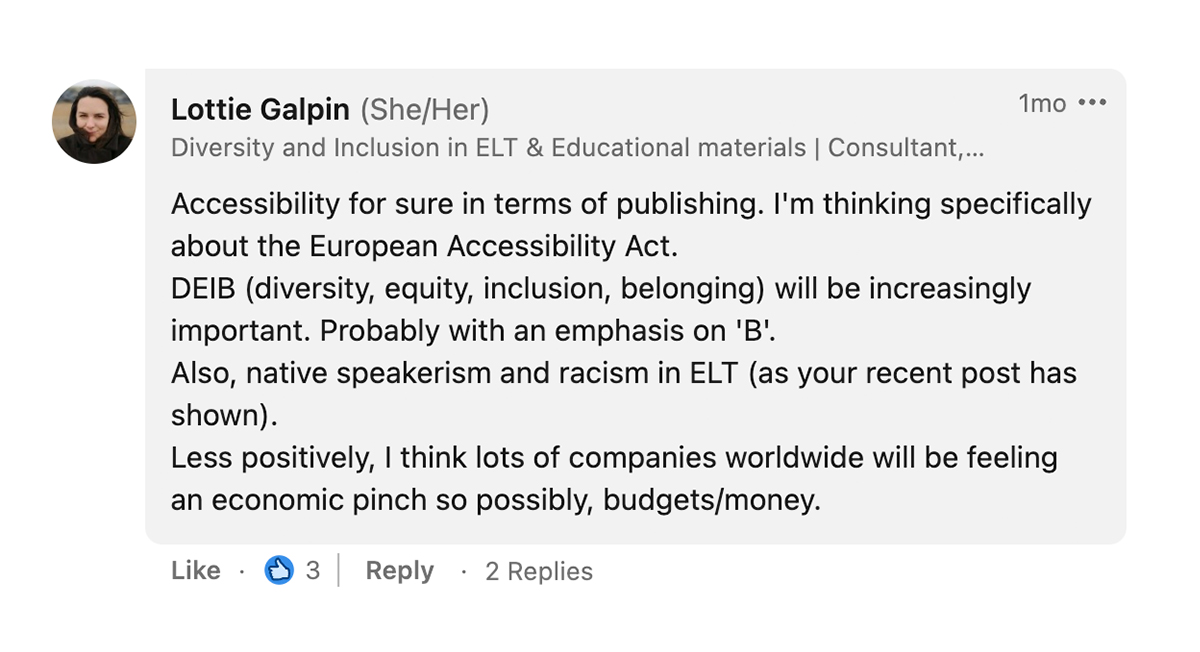
To join the discussion and learn more about diversity and inclusion, the Reflecting Reality: Diverse and Inclusive ELT Materials Facebook group is a great place to start.
Related articles on inclusive English language teaching
- Accessibility: Supporting English Learners with Dyslexia
- 6 Ways to Support English Learners from Refugee Backgrounds
- 5 Ways to Promote Mental Health in the English Language Classroom
- 8 Tips for Developing Students' Digital Literacy
3. Virtual reality
Talking about virtual reality (VR) feels like a moment when you realize you’re living in the future! VR wasn’t something I identified as an ELT trend for 2023, but it was suggested twice in the comments and has made me realize just how much I’ve been noticing it more and more on my social feeds.
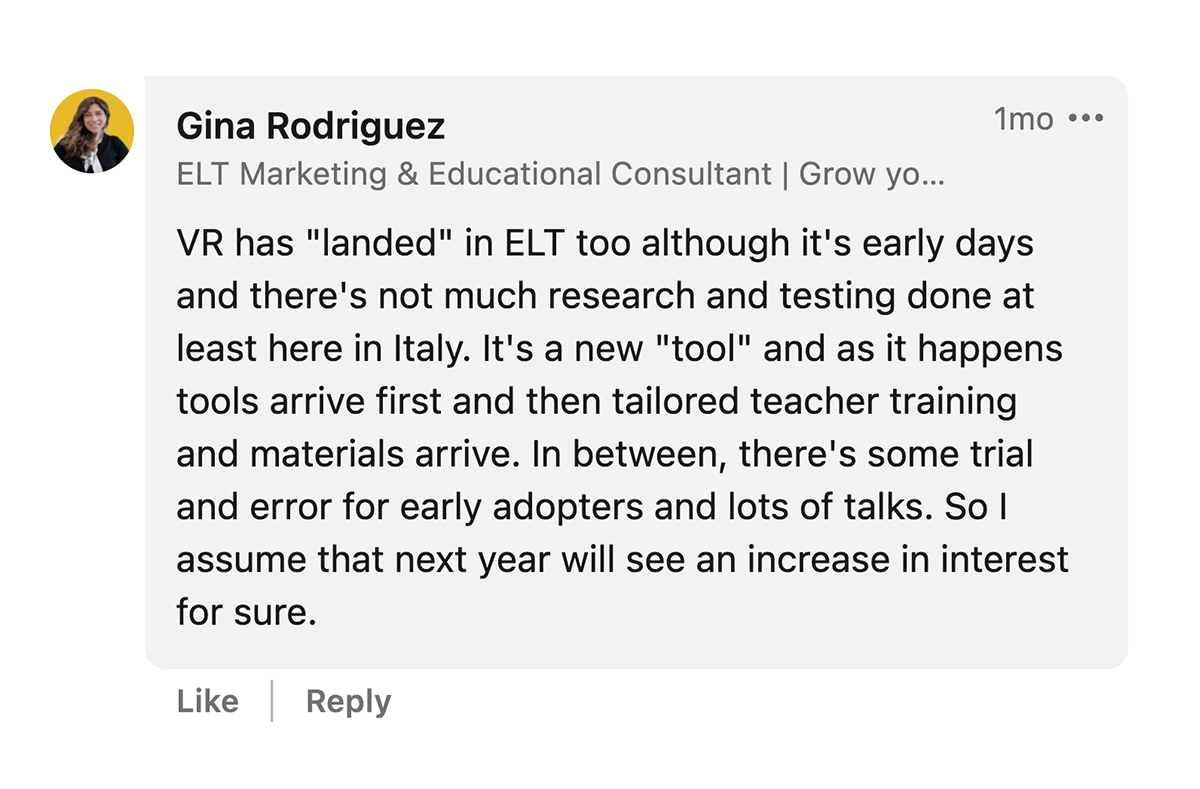

Research has found the following benefits of VR:
- Students spoke at a higher level after using VR (B1 instead of A2).
- Vocabulary retention is higher with VR.
- VR supports the use of positional language (e.g., "up there").
- Students retained emergent language while using VR.
- Anxious students were more confident when using VR rather than in class.
VR-related materials for the classroom:
4. Mediation
In an ELT context, mediation refers to the ability to convey meaning. Essentially, it’s explaining concepts, knowledge, or understanding to others in a way that supports learning.
For example:
- relaying the information from a text
- describing a visual, graph, or chart
- summarizing a source of information (e.g., an infographic/video)
- translating and sharing key points
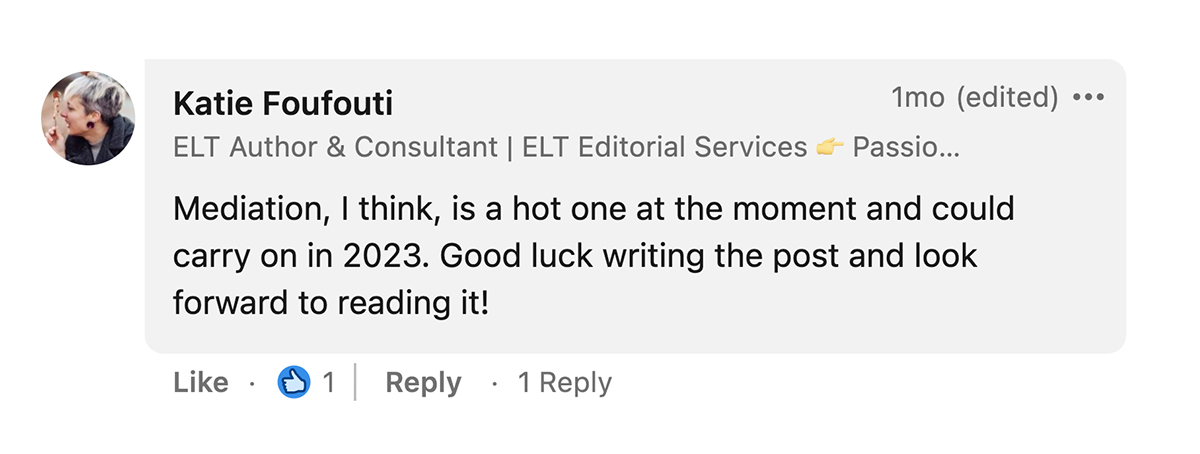
Including mediation activities in the classroom supports learners' development of real-world skills, such as communication and note-taking.
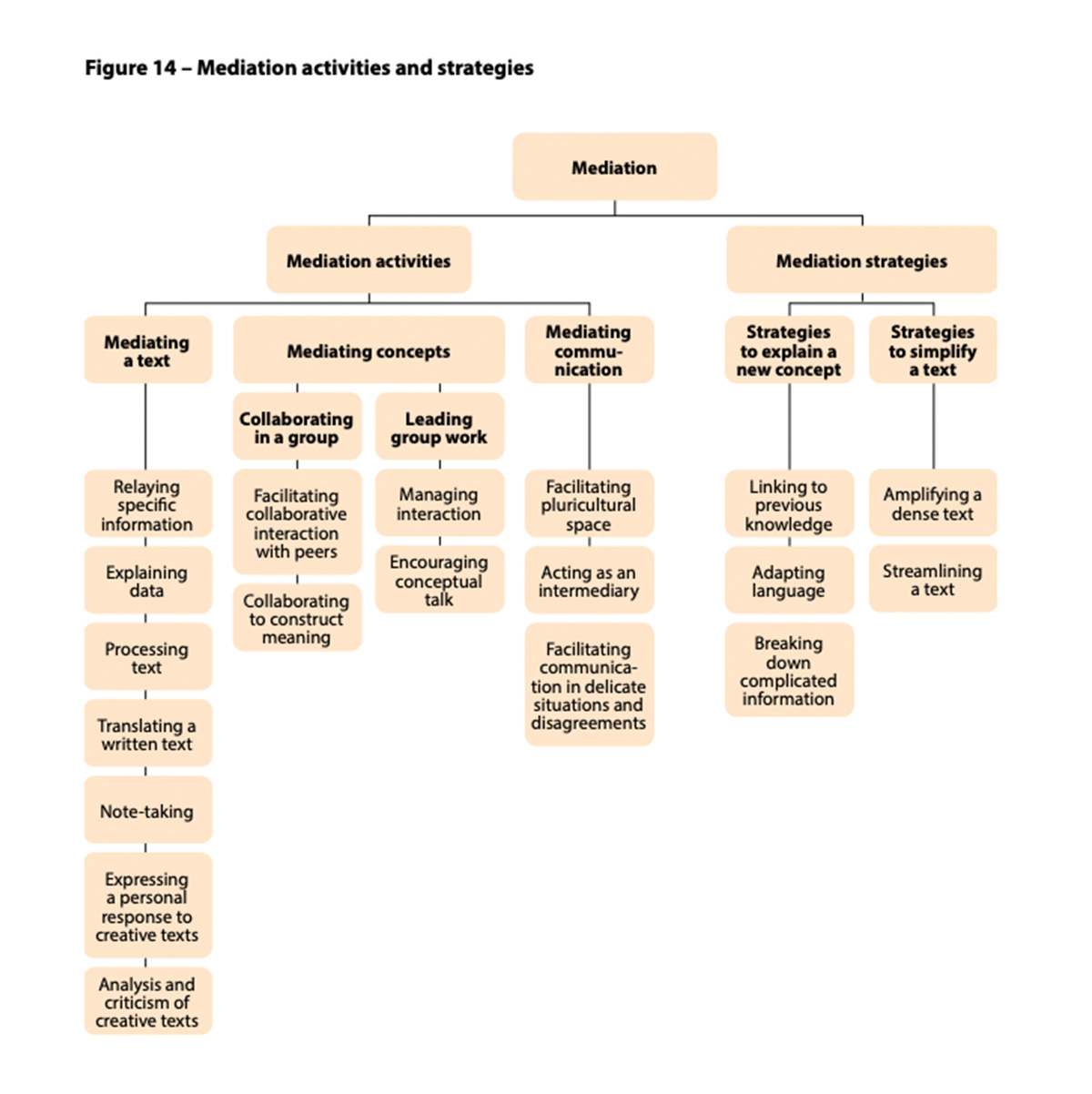
Mediation activities and strategies from the Common European Framework of Reference for Languages: Learning, Teaching, Assessment.
5. Life skills
As language teachers, we want our learners to succeed in the real world as well as in the classroom. This involves incorporating life skills into our classes.
Life skills are often referred to as "soft skills," "21st-century skills," or "transferable skills." They include skills such as communication, social, academic, critical thinking, problem-solving, digital, and work.
Their importance to student success is what will keep them trending in the ELT industry throughout 2023.


Boost your students' life skills with these lessons
6. Task-based teaching, learning & assessment
Task-based learning (TBL) has been around for years and will continue its popularity in 2023.
The approach is based on giving students a task to complete and allowing the language to emerge naturally throughout the course of the lesson.
A favorite task-based activity of mine is giving students a pile of scrap materials and asking them to work together to build a bridge. Students then collaborate in groups to construct something that is stable and can hold the weight of a toy car. Throughout the lesson, language such as "I think we should fold this paper," "Pass the sticky tape" and "Wouldn’t it be stronger if we…" emerges.
Task-based learning offers a natural way for students to use and develop their language skills. It’s also a great way to incorporate life skills and real-world tasks into the classroom.
From an assessment perspective, it's beneficial in ensuring that assessments become part of the learning process.
Project-based learning is similar to TBL in that it gives learners a task to complete over a period of time.
Group Projects
These project-based learning modules are intended as group projects that can be completed within a two- to four-week time period along with other coursework. The projects include research tasks and presentations that are useful for individual, peer, and group assessment.
Share your thoughts
What English language teaching trends do you expect to see in 2023? Share your ideas in the comments!
Comments
There are no comments on this post. Start the conversation!



